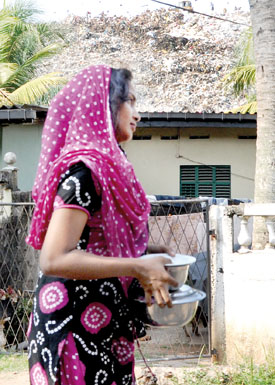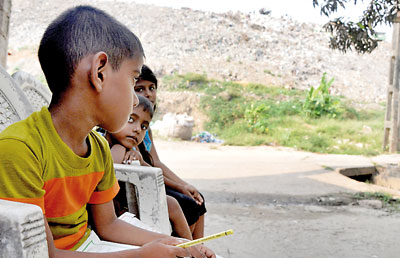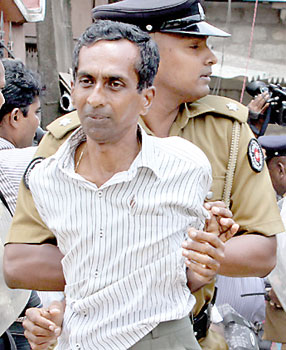News
The air is foul with disease, despair and deferred solutions
View(s):Aanya Wipulasena reports on the lives of the 4700 families living around the garbage disposal dump in Meethotamulla, Kolonnawa
It was claustrophobic in the small and sparsely furnished room – and we had only been there 10 minutes. A gust of air blew in a foul smell that made us wrinkle our noses in disgust. Inoka Priyangani, 32, who was watching us, smiled humbly. We were in her house in Meethotamulla, where more than 700 tons of garbage taken from Colombo are dumped every day. We apologised when we realised that our reaction had been noticed by our host but she understood.

A resident carries food, in the background the big stench looms large. Pix by Indika Handuwala
“There is no need to feel bad about it,” she replied. “Our own relatives scarcely spend a couple of hours here when they come to visit us, and sometimes they refuse to drink even a glass of water we offer.” At school, her seven-year-old daughter was laughed at by classmates because her uniform smelled terrible.
“What am I to do, miss? I wash these clothes every day but when we hang them out to dry the foul air makes them smell appalling,” Priyangani said. “There are times I have emptied a bottle of baby cologne onto the uniform to make it pleasing enough for my child to wear to school,” she said.
This is life for the 4700 families at Meethotamulla, clustered around the garbage disposal dump in Kolonnawa. The high waste heap in front of their houses looms large in their lives.
The children fall sick frequently, and death is as common as the Colombo Municipal Council lorries that bring the waste here.
“Our son was a healthy child. He played in the backyard with the other boys and was always very eager to learn new things. We looked after him but he fell sick when he was just 12 years old,” said M. D. Ramyalatha, 54. The boy died of encephalitis seven years ago from the germ-ridden air.
The woman’s plight became worse. Just a few months ago, she found out that she has lung cancer that, doctors say, is a result of the toxic fumes and chemicals continuously inhaled by these residents.
Gunarathne Manike, 58, suffers from an incurable skin rash caused by contact with the contaminated air and water. “My son has taken me several times to the doctor but the rash doesn’t disappear. My husband is also sick. He’s the sole bread-winner and we all depend on his income. We have to spend a lot for medication every month,” she said.
Research by the Women’s Movement for Freedom shows that 90 per cent of the children in the area suffer from infections such as skin diseases and also from respiratory problems. Sixty per cent of the women and children constantly suffer from bowel complaints.
Also worryingly, 75 per cent of the students fail to go past the Ordinary Level exams.

Students find it difficult to concentrate on their studies amidst the garbage
“My other son is to sit for his O/L exams this year but he complains of constant headaches and says that he can’t concentrate on any of his studies. He is a bright child and, like his older brother who died, he is anxious to study,” Ramyalatha said. Nearby Sri Rahula Vidyalaya was closed in January this year after teachers refused to work in the foul environment.
The authorities now say they will reopen the school but the residents claim that it will in the future only go up to fifth grade when previously it held classes up to A/L.
When the Sunday Times questioned the Director of Health Services of the Western Province, Dr. Amal Harsha de Silva, about the impact of the garbage dump, he said that as the density of germ-laden insects increased the rate of infections also increased.
The gases shooting out of the garbage is causing cracks to appear in houses. So far, 101 damaged houses have been demolished by the CMC and 30 more houses have been deemed unfit for habitation. The families who lost their homes are each receiving a monthly payment of Rs. 10,000 until new homes are provided. This has cost the council Rs. 14 million to date.
Action and reaction
Residents of Meethotamulla, banding themselves together as the People’s Movement against the Meethotamulla Garbage Dump, last Saturday (April 6) staged a satyagraha campaign demanding that the CMC immediately cease dumping garbage in Kolonnawa.
When they staged a similar protest on January 4, the authorities promised a solution within three months.

A member of the group, Keerthi Rathna Perera, told the Sunday Times that as the authorities had failed to take action the residents had decided to campaign by blocking the roads leading to the dump.
Senior DIG Anura Senanayake and Municipal Commissioner visited the area last Monday to discuss the situation but as they failed to provide a written assurance that the garbage disposal would be halted, the residents continued their campaign.
The campaign had not gone as peacefully as intended. On Tuesday, police and Special Task Force officials attacked the people taking part in the road blockade. As a result of the police action, one woman was admitted to hospital with a fractured skull. Six people, including two women, were arrested.

Police in action at a demonstration that started off peacefully
The Mayor of the Kolonnawa Urban Council, Ravindra Udeshantha, told the Sunday Times that the residents were being guided by “external political bodies” and should have voiced their complaints differently.
He said that the CMC was only permitted to dump garbage in two acres of land but that the volume of garbage had caused the dump to spread to 15 acres, causing hardship to the local population.
“We have asked the residents of the area to tolerate the situation till the end of this year and we hope to provide a good solution,” Mr Udeshantha said. “I have spoken about this matter with the Secretary of Defence and Urban Development, Gotabaya Rajapaksa, and we are planning to find alternative dumping yards or, alternatively, a place for the residents to move to by then,” he said.
Colombo Mayor A. J. M. Muzammil told the Sunday Times that the council has legal authority to dump garbage on 15 acres of land and it would continue disposal at Kolonnawa. “We are always with these families and are willing to listen to their issues. But we will continue our work as before,” he said.
He said Colombo residents would soon be required to separate their garbage into organic, glass, metal and paper waste. “From June 1, we will only collect the organic waste.
This will help to cut down the amount of garbage that goes to Kolonnawa each day from 25 per cent. The public are asked to sell the other waste to companies that recycle them,” he said.
Follow @timesonlinelk
comments powered by Disqus














